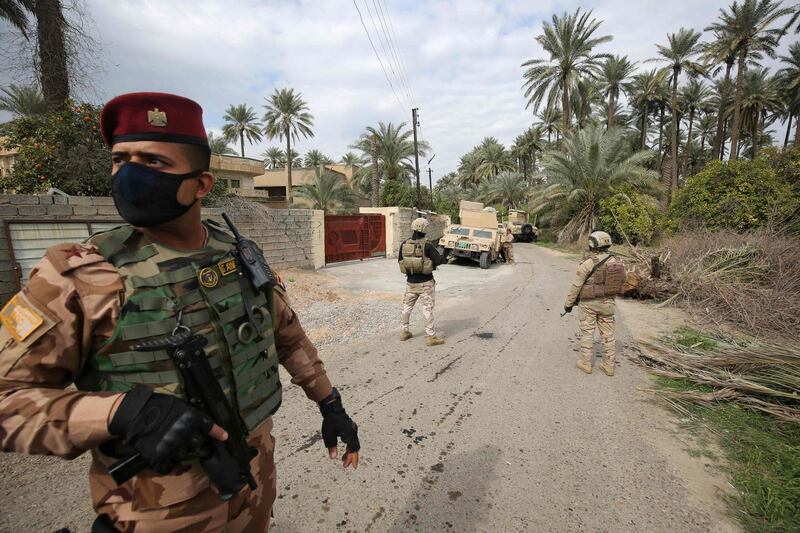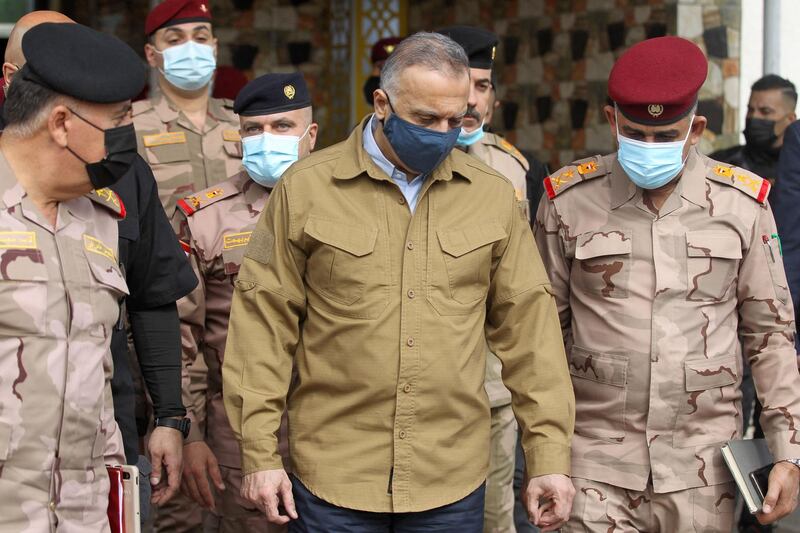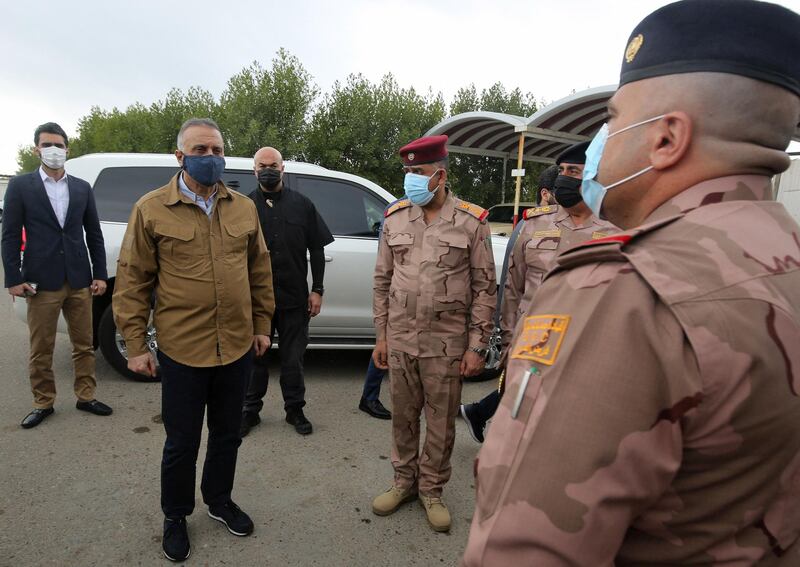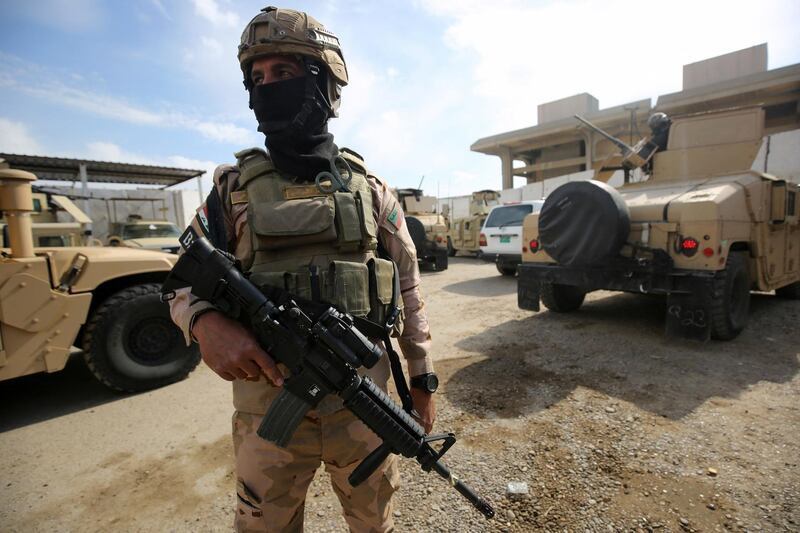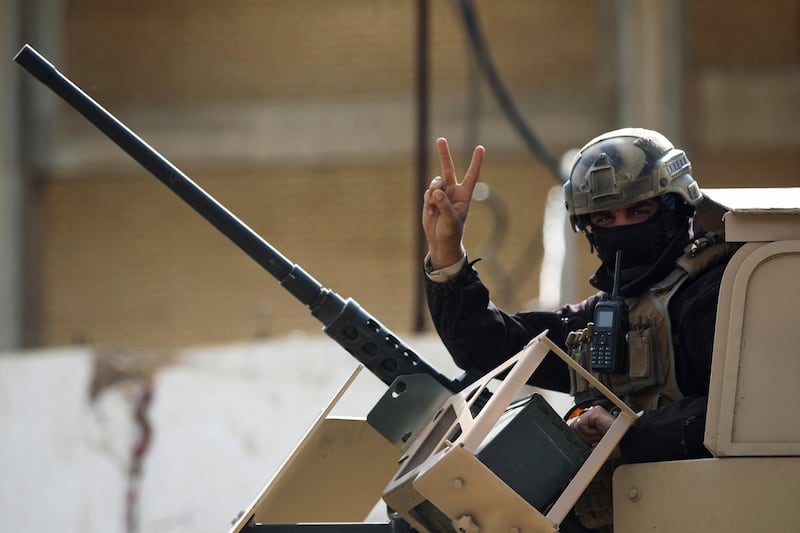Iraq's Prime Minister Mustafa Al Kadhimi meets US President Joe Biden in Washington on Monday in the latest round of dialogue on strengthening bilateral security.
In an interview published a day earlier, he touched on the focus of the meeting for political forces at home, saying: “There is no need for any foreign combat forces on Iraqi soil.”
US forces returned to Iraq in 2014 to lead an international effort against ISIS which largely focused on training and advising, although some US combat troops accompanied Iraqi Special Forces on anti-ISIS missions until 2019.
Mr Al Kadhimi has said before that Iraq no longer needed US combat troops, a position analysts consider to be symbolic because technically, the small US military presence in Iraq is there to train the Iraqi military.
Even if US forces were present solely for combat, the military “tooth to tail” ratio – the number of troops who can be deployed in battle (“tooth”) for every soldier in a logistical role (“tail”) would mean that in a crisis, fewer than 30 per cent of the 2,500 US soldiers in Iraq now would be able to fight at a given time, according to a 2007 US military study.
Without factoring in civilian contractors, the percentage available to fight would be far less.
US forces voted out?
Mr Al Kadhimi’s statements are aimed at Iraqi political parties who consider any presence of US combat forces as occupation.
The Iraqi parliament is dominated by parties linked to militias who are either accused of fighting US forces or have fought them in the past, including Asaib Ahl Al Haq and Saraya Al Salaam, headed by the radical cleric Moqtada Al Sadr.
There is also the powerful Badr Organisation, a group with strong influence in the Iraqi police which also has a number of parallel militias.
These groups fall under the Popular Mobilisation Forces (PMF), an umbrella organisation of paramilitary groups mostly linked to Iran’s Islamic Revolutionary Guard Corps.
This is problematic for Mr Al Kadhimi.
PMF-linked parties passed a parliamentary resolution on January 5, 2020, that mandated the withdrawal of all US forces.
The resolution was passed two days after the US killed the de facto PMF head Abu Mahdi Al Muhandis in a drone strike near Baghdad. He was assassinated along with Iranian general Qassem Suleimani, characterised by many analysts as the brain of Iran’s regional irregular warfare efforts.
Parliament’s decision, some argued, was non-binding because under the Iraqi constitution legislation originates in the executive before being passed by lawmakers.
The prime minister at the time, Adel Abdul Mahdi, voiced support for a continued US presence despite initially supporting the vote.
“In view of the continued activity of ISIS terrorist gangs in many regions of Iraq ... it was decided to undertake joint actions [with the coalition] that provide facilities for our forces, ” he said in February 2020.
Mr Abdul Mahdi’s government was beset with other problems, including a nationwide protest movement and the coronavirus pandemic that would eventually spur his departure.
The US remains instrumental in supporting Iraq's counter-terrorism efforts, including providing maintenance for high-end equipment such as F-16 jets. This has been vital for keeping ISIS remnants suppressed in Iraq’s hinterlands, useful for Mr Al Kadhimi, given how politically damaging large ISIS attacks are in Iraq.
Kadhimi's balancing act
Mr Al Kadhimi, who replaced Mr Abdul Mahdi in May last year, consolidated his position with the backing of Mr Al Sadr’s powerful but unpredictable movement, which according to a recent Reuters investigation has continued to seed most of Iraq’s bureaucracy with loyalists.
A host of smaller moderate parties also backed Mr Al Kadhimi, taking the wind from momentum to remove coalition forces.
Mr Al Kadhimi’s announcement that US combat forces must leave Iraq will be likely to be seen as an attempt at appeasing rivals who demand nothing less than complete withdrawal.
It is difficult to tell what will happen next in Iraq's fractious parliament.
Iran-backed groups, including some of Iraq’s most well-equipped militias, are once again waiting to see whether political pressure can get them results.
For now, this means holding back from major attacks on US forces.
Mr Al Kadhimi might seek assurances of more US support in his efforts to rein in these groups. But like the Iran-backed groups, he is wary of major escalation.
Adding to the likelihood of inertia, Mr Biden’s government has little appetite for deeper engagement in Iraq, and the US military has shown reluctance to launch large-scale counter strikes after PMF attacks.
“The pro-Iran camp has the initiative because it can up the ante with more intense attacks any time it wants. US deterrence has been ineffective [in] hitting camps of Iran-backed groups out on the Iraq-Syrian border, and I've gotten the impression that US military doesn't like escalation,” said Joel Wing, a California-based analyst who has been tracking violence and political developments in Iraq for 13 years through his blog, Musings on Iraq.
"In Monday’s meeting, we can expect that a small reduction of US forces will be formalised, which will be unacceptable to radical Iran-backed groups."
Small-scale attacks, such as the explosive drone attack on a US military base in Iraq's Kurdish region on Friday, are likely to escalate once more and could prove fatal yet again.
But a strong response from Washington is unlikely. During his election campaign in 2019, Mr Biden touted his efforts to fully withdraw US forces from Iraq, despite Republican misgivings.
